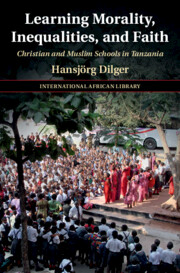Book contents
- Learning Morality, Inequalities, and Faith
- The International African Library
- Learning Morality, Inequalities, and Faith
- Copyright page
- Contents
- Figures
- Acknowledgements
- Note on Language Use
- 1 Introduction
- Part I (Post)Colonial Politics of Religious Difference and Education
- Part II Moral Becoming and Educational Inequalities in Dar es Salaam
- References
- Index
- Titles in the Series
1 - Introduction
The Quest for a Good Life in Faith-Oriented Schools
Published online by Cambridge University Press: 16 December 2021
- Learning Morality, Inequalities, and Faith
- The International African Library
- Learning Morality, Inequalities, and Faith
- Copyright page
- Contents
- Figures
- Acknowledgements
- Note on Language Use
- 1 Introduction
- Part I (Post)Colonial Politics of Religious Difference and Education
- Part II Moral Becoming and Educational Inequalities in Dar es Salaam
- References
- Index
- Titles in the Series
Summary
The introduction situates the book’s conceptual argument in the anthropological and social scientific scholarship on ethics and morality, secular and religious schooling, faith-based development, and Christian–Muslim encounters. I argue that students’ and teachers’ quests for a good life in Dar es Salaam’s faith-oriented schools are shaped by three interrelated dynamics: (1) the individual and collective search for ‘moral meanings’ with regard to all aspects of academic and everyday life becomes embodied – and modified or challenged – in the everyday interactions between and among students and teachers; (2) notions of and aspirations for a good life are imagined and embodied by students and teachers in relation to large-scale historical forces (including colonial and postcolonial histories of education and Christian–Muslim relations, as well as more recent histories of privatisation and faith-based development); and (3) the politics of Christian–Muslim difference in contemporary (and historical) Tanzania shapes the articulation and rearticulation of moral, social, and religious belonging in faith-oriented schools. I also outline the methodological approach – and the epistemological politics – of doing fieldwork in Christian and Muslim schools in Dar es Salaam, and reflect on my own positionality during fieldwork in a highly politicised field.
Keywords
- Type
- Chapter
- Information
- Learning Morality, Inequalities, and FaithChristian and Muslim Schools in Tanzania, pp. 1 - 32Publisher: Cambridge University PressPrint publication year: 2021

